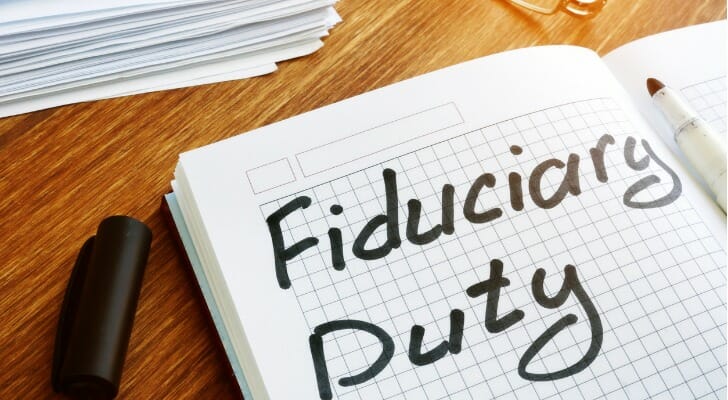
Financial advisors have all sorts of different specializations and services that they offer. In turn, there are a number of certifications they can receive to show off those areas of focus. Some of the most popular ones are certified financial planner (CFP), chartered financial analyst (CFA) and accredited investment fiduciary (AIF). If an advisor is an AIF, it illustrates their knowledge of ethical behaviors that follow a fiduciary duty to their clients.
Are you looking for the services of a financial advisor? Speak with one today.
What Is an Accredited Investment Fiduciary (AIF)?
The Accredited Investment Fiduciary (AIF) is an ethical certification issued by Fi360. That body is sometimes known by its former name, the Center for Fiduciary Studies.
An AIF has completed Fi360’s course on ethical behavior and fiduciary services. The advisors have learned to balance their business interests against a client-first (or fiduciary) approach.
The AIF credential focuses on improving client service. However, it also aims to make professional life safer for financial advisors. For example, part of the course involves best practices and documentation. That can help financial advisors avoid mismanagement claims by having proper documentation and avoiding conflicts of interest.
This is increasingly essential for financial advisors. In the wake of the Obama-era rule, retail investors are sensitive to fiduciary duty and conflicts.
Requirements for Becoming an AIF
To receive this certification, a financial advisor must complete either Fi360’s in-person training course or its online web program. The cost of that training ranges from $1,600 to $2,000.
They then must pass a final exam and complete six hours of continued education per year. Also, the advisor must attest to a code of ethics written by the institute. The education focuses particularly on Fi360’s Prudent Investment Practices.
What Is Fiduciary Duty?

In 2015 the Barack Obama administration passed a rule through the Department of Labor holding that investment advisors have what is called a “fiduciary duty” to their clients.
In short, fiduciary duty is considered the highest standard of care required by law. Whether you’re an attorney or a financial advisor, it requires you to serve the best interests of your client above all else.
Jobs that require this standard usually require a high degree of specified knowledge. The average person typically won’t be able to understand or refute the advice they’re given by such professionals. These same professionals could also inflict great harm on their clients by acting in their own interests.
These criteria broadly establish the two most common elements of a fiduciary duty: the duty of care and the duty of loyalty.
For example, attorneys owe a fiduciary duty to their clients. Once retained, a lawyer must put the needs of the client first and advise accordingly. A lawyer who ignores that and suggests that her client try a bad case just to run up the bill, for example, could face penalties up to and including disbarment.
Should You Hire an AIF?
No online seminar can instill good ethics in someone. A financial advisor determined to cheat clients and prioritize commissions over sound guidance will do so. However the AIF credential tells you two things that can help in picking an advisor:
- First, they cared enough to get the certificate. Double-cross schemes are rare in the real world. It’s unlikely that a sleazy advisor would go to all the trouble of getting the AIF just to gain your trust. If they have this certificate, they likely care about their ethical duty.
- Second, it shows that they will create a paper trail. The AIF certification teaches documentation best practices. If you ever have questions about your investments, you can ask your advisor to show their work.
Bottom Line

The AIF credential is all about trust, and you have to trust your financial advisor. If nothing else, it’s important to prioritize professionalism. It isn’t always best to trust your money to someone just because they can give you a better deal or happen to live closer to your commute. When it comes to choosing a financial advisor, professionalism and ethics can be the most important criteria.
Also, try to remember that this is your money too. You may want to look into the funds that your advisor recommends. Consider reading up on your investments and understanding exactly what (if anything) your advisor will get out of it. You’ve hired this person, so you’ll want to trust their opinion. But that’s no excuse not to do your own research too.
Investing Tips
- A financial advisor can help you with things like investing, financial planning and more. Finding a financial advisor doesn’t have to be hard. SmartAsset’s free tool matches you with up to three vetted financial advisors who serve your area, and you can interview your advisor matches at no cost to decide which one is right for you. If you’re ready to find an advisor who can help you achieve your financial goals, get started now.
- Still don’t know how much investment risk you’re willing to tolerate? Do you know how much you’ll need to invest to meet your goals? Are you worried about inflation and capital gains taxes taking a bite out of your investment? SmartAsset’s investment calculator can help you get answers and start planning for the future.
Photo credit: ©iStock.com/designer491, ©iStock.com/wichayada suwanachun, ©iStock.com/marchmeena29